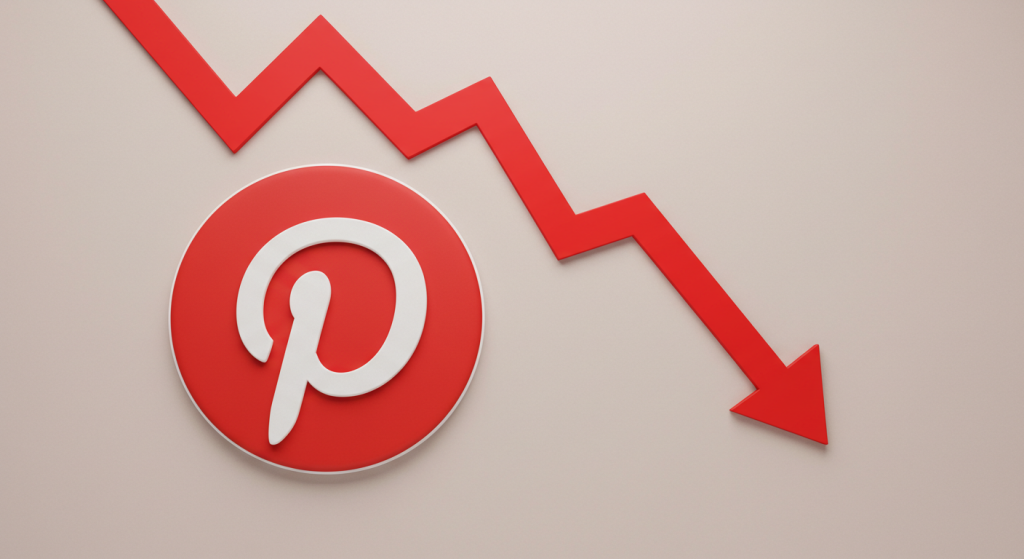Pinterest was once a creative haven, a digital vision board brimming with real-life inspiration, aesthetic content, and curated ideas. But in recent years, that experience has drastically changed. Users are now asking a serious question: Is Pinterest dying?
The short answer? Yes, and it’s happening for three main reasons: ad saturation, overwhelming AI-generated content, and unchecked spam behavior.
The Pinterest User Experiment
To understand just how bad things have become, I conducted an experiment based on a few videos i saw online, mainly from YouTuber’s SamDoesArts, Victoria Gillerlain, and eliznuts using three different Pinterest profiles:
- New user (fresh account)
- Medium-term user (moderate pinning history)
- Long-term user (active account with years of history)
Each account was tested over a 10-minute scrolling session on both the home and search feeds, using consistent keywords. Here’s what I found:
🆕 New Users:
- Home feed: 0–1% AI content, almost no ads
- Search feed: ~5% ads, 0–5% AI
This is the cleanest Pinterest experience, but only because the algorithm hasn’t had time to push monetized or manipulated content.
👥 Medium-Term Users:
- Home feed: 50–60% ads, ~50% AI content
- Search feed: 30% ads, 30–65% AI content
Even minor interaction with AI pins caused a flood of AI-generated junk, showing how aggressively Pinterest responds to such engagement.
📌 Long-Term Users:
- Home feed: 33% ads, ~5% AI
- Search feed: 30% ads, ~5% AI
This user saw fewer AI posts due to minimal interaction with AI-generated pins, but ad volume remained high.
What’s Causing Pinterest’s Decline?
1. Ad Overload
Like most social platforms, Pinterest is monetized through ads. But it hasn’t been consistently profitable until recently — so it’s turned up the volume. The result? Users are now seeing 30–60% of their screen filled with sponsored content at any given time.
2. AI-Generated Content Flood
AI content isn’t just slipping through — it’s dominating. Once you interact with a few AI pins, Pinterest’s algorithm floods your feed with similar content. Most of it is low-effort, unrealistic imagery that links to shady, low-quality websites — often packed with Google ads and questionable cookies.
3. Spam Bots & Scam Accounts
Bots are mass-producing AI content and spamming the platform. Many of these accounts are test or “throwaway” profiles later sold to advertisers or scammers. The goal? Overwhelm the system with fake content that leads users to clickbait websites or scam products.
Why Pinterest Allows This
Pinterest has no real incentive to stop it. Sponsored posts and AI content are:
- Cheap to produce
- Effective for engagement
- Profitable
Even if the quality declines, the algorithm keeps users scrolling and clicking. If users engage with AI, Pinterest doubles down. If they interact with ads, Pinterest profits. It’s a vicious loop.
What Can Users Do?
You have a few options:
- Ignore it and keep scrolling – Accept the decline, stay aware of scams, and hope Pinterest doesn’t get worse.
- Curate your feed intentionally – Avoid interacting with AI content, report spam, and only pin genuine posts. This slowly trains the algorithm.
- Leave the platform – Look for alternatives that value creativity and real content over monetization.
What Pinterest Should Do
If Pinterest wants to regain its former glory, it needs to take serious steps:
- ✅ Crack down on scammy advertisers with stricter vetting processes
- ✅ Introduce AI tagging or filtering so users can choose whether to see AI content
- ✅ Boost transparency with clear labels for sponsored and AI content
- ✅ Rebrand as an authentic, creative sanctuary while competitors collapse under ad and AI pressure
Final Thoughts
Pinterest’s current trajectory is disappointing for long-time users. The platform is overloaded with ads and AI content, leading to a disjointed, artificial experience. If Pinterest doesn’t address these core issues soon, it risks losing the very community that built it.
Your attention is valuable — if a platform is going to profit from it, it should give you a quality experience in return.




